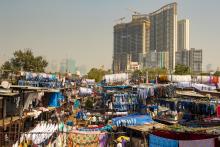Development

Though I was never a missionary in the standard sense of the word, never proselytized or attempted to save souls, the engine driving me was the white savior complex. I thought the dark bodies living in the developing world needed us white, Western, Christians. The other Westerners I worked with believed we had it all pretty much figured out. We had the right theology. We had the right answers. We had the expertise. We were the so called “whole” condescending to help the “broken.”

One could say dignity has three elements: Agency, that entails people being able to act autonomously and use their gifts and thrive; recognition, that provides a sense of value in the social communities that all people find themselves in; and implementation and institutionalization of that agency and recognition, to ensure dignity’s presence over time.

A Vatican envoy urged the World Trade Organization to keep promises made to the poor, amid concerns that its tariff-cutting efforts are disproportionately benefiting rich countries. The appeal came as the WTO, a Geneva-based organization that regulates international trade, was holding a four-day meeting ending Dec. 18 in the Kenyan capital.

CANADIAN MINING companies have left a trail of destruction around the world—mostly in places where people are poor and vulnerable.
The earliest conflicts caused by Canadian mining exploded in Guatemala in the early 1960s when the nickel company Inco dug into the northern mountainside of Guatemala’s largest freshwater lake, Lago Izabal. Almost 155 square miles of traditional Kekchi-Maya land was expropriated to create Inco’s Exmibal mine. As the region descended into bitter war, Guatemalan oligarchs and their military, with the support of Canadian-mining and U.S. geopolitical interests, exterminated all popular dissent. Dozens of Kekchi leaders were killed or disappeared; four prominent leaders who had published a report condemning the Inco-Exmibal deals were brutally assaulted and two of them assassinated. The Exmibal mine operated for three years before Inco abandoned it, never paying a nickel in royalties to Guatemala

DOÑA DIODORA STANDS on the side of the mountain, shivering. She’s tending to her skinny cows. A simple adobe hut stands here on the edge of her land in the Guatemalan highlands—“so I can stay and look after the animals,” she says. “But I don’t know what I am going to do about water. They’ve taken away the water.”
Tears drip down out of her good eye. She dries them on a thin sleeve. The other eye socket, shattered where the bullet went through, seeps with yellow pus. “Me siento un poco triste—a little sad,” she explains in her halting, quiet Spanish. It is cold on the mountain, achingly so. And, mysteriously, the water has gone: Old streams and wells are dusty. The cows look ill.
Just down the crumbling mountain, the tailings pond from the Marlin mine glows a weird shade of neon green.
I first heard about the Marlin mine—operated by Vancouver’s Goldcorp—in 2005, before it opened. That year I was going to Guatemala with a youth group from my diocese, and we were warned: Don’t wear anything that identifies you as Canadians. What? Canadians? We’re supposed to be the good guys in the story. Well, not anymore.

AS THE U.S. prepares to officially (but not completely) pull out its military from Afghanistan by the end of 2014, some wonder whether it all was a waste. More than a decade of war has cost tens of thousands of lives and hundreds of billions of dollars. But the balance sheet of “lessons learned” shows some less-depressing calculations.
In the last several years, U.S. generals have repeatedly told Congress and the U.S. public that “there is no military solution” to the war in Afghanistan. This marks a significant shift in military thinking. In the early 2000s, the boastful, overconfident views that wars in Afghanistan and Iraq would be quick and easy outnumbered more cautious and skeptical military voices. If nothing else, more military leaders today are forthrightly speaking out against the fantasy of firepower solutions to complex political problems.
The U.S. and its Western allies are also learning a related lesson: The lack of legitimate governance is a fundamental cause of much of the world’s violence. Afghanistan’s political leaders who opposed the Taliban became de facto Western allies, even though many had ruled by force and racked up their own long list of human rights abuses. In the rush to set up a new government to replace the Taliban, the West propped up corrupt and tyrannical warlords as provincial governors, dooming hopes for an Afghan democracy and authentic leaders with popular support.
Counterinsurgency projects attempted to pull support from the Taliban and other insurgents by winning Afghan hearts and minds so they would trust their government. But Western military forces learned that free handouts of Western aid money could not fundamentally change the corrupt nature of the Afghan government or its public image.
TODAY THE Middle East—where about 60 percent of the population is under the age of 25—is a region dominated by humiliation and anger. Failure plus rage plus the folly of youth equals an incendiary mix.
The roots of anti-American hostilities in the Middle East run deep. We can start with the fact that what we consider our oil lies beneath their sands. Couple that with U.S. support of repressive regimes, the presence of foreign troops on their land and in their holy places, and the endless wars waged there, ultimately fueled by the geopolitics of energy. Add to that the unresolved Israeli-Palestinian conflict, which continues to drive the deepest emotions of mutual frustration, fear, and retaliation throughout the Middle East and around the world.
Injustices and violence caused by the oil economy have sparked a reaction from dangerous religious fundamentalists in the Muslim world. Fundamentalism—in all our faith traditions—is volatile and hard to contain once it has been unleashed, and it is hard to reverse its essentially reactive and predictably downward cycle.
Three principles may help us navigate a path out of this mess. First, religious extremism will not be defeated by a primarily military response. Ample evidence proves that such a strategy often makes things worse. Religious and political zealots prefer military responses to the threats created by Islamic extremism. Ironically, this holds true on both sides of the conflict; the fundamentalist zealots also prefer the simplistic military approach because they are often able to use it effectively. Fundamentalists actually flourish and win the most new recruits amid overly aggressive military campaigns against them.

Annie Lowrey's recent New York Times magazine article "Washington's Economic Boom, Financed by You" provides a stimulating look into Washington, D.C.'s "economic boom" of the last few years. As D.C. residents, many of us encounter the ongoing transformation of our city every day. We know the area's economy has grown about three times as much since 2007 as the country — largely a result of expanded government spending (primarily in the form of two foreign wars). We also know that the greater metropolitan region is one of the richest in the country. As Lowrey noted, the Washington metro area has seven out of the top 10 highest-income counties in the U.S., including the three highest.
However, Lowrey only tells one side of the story — the rich side. The "economic boom" has largely passed by D.C.'s poor and working people. By not mentioning D.C.'s grossly high poverty rates, the article is misleading.
Amid Washington's economic boom, there is also massive economic displacement, increased economic inequality, and higher rates of poverty.
The big red barn on my family’s farm was built in the 1880’s.
The wood beams (almost nine feet off the ground), were wide enough for my mom, her siblings and a few other kids from nearby homes to run along. One of their favorite games was a modified sort of dodge ball with one person standing on the barn floor taking aim at the others running on the beams.
It was not safe. But...it was a lot of fun.
As kids ourselves, my brother and I tried to imitate this game in the barn and my mother soon got upset with whichever one of our uncles had told us about it.
My brother and I climbed trees much higher than reasonably advisable and spent hours wandering in the woods unsupervised. During the winter we built “jumps” for sledding runs that were dangerous enough that they routinely spilt blood.
Minor injuries were a regular part of our play. And, it was fun.

Less than one percent of the federal budget goes to foreign aid. Our spending on development and foreign assistance is not -- by any stretch of the facts or imagination -- our national debt.
Cutting foreign aid programs will do little to get us out of debt, but would be a devastating setback in the fight against global, extreme poverty.
"For every 5 percent drop in income growth in a developing country, the likelihood of violent conflict or war within the next year increases by 10 percent. Poverty-focused development assistance supports economic growth, protects vulnerable people, and helps curtail desperation that may lead to violence" (Bread for the World).
On Wednesday, the Senate will vote on the budget for foreign aid. Should the proposed cuts occur, it would prove disastrous for the rest of the world, potentially leaving millions without food, education, and livelihood.
Please, contact your Senators today and tell them to continue funding poverty-focused development assistance.
Social justice index: USA No. 27 of 31. Democrats in Congress attempt to eat on $4.50 a day to protest potential budget cuts. Republicans shift focus from jobs to God. OpEd: Obama, the G20 and the 99 percent. In Congress, the rich get richer. The Shadow Superpower. And the U.S. sues South Carolina over immigration law.
Last Saturday, August 20, 2011, I got arrested. Having never been arrested before, it feels strange to write that. Like most Americans I associate getting arrested with committing egregiously unlawful acts that require punishment
Rose Berger from Sojourners magazine spoke to the hundreds of us gathered in Lafayette Park just before we processed to the fence surrounding the White House. She mentioned the irony of building a monument to Dr. Martin Luther King, Jr. by the powerful political forces who disregarded or dismissed his message during his lifetime -- we only honor him after he is safely dead. How ironic also that the dedication of the monument was postponed by the most recent example of significant climate change. Will evidence of climate change begin to also signal political change?
Rose called on us to take up the banner of the Living Spirit of Dr. King within ourselves and allow it to inspire us as we risked arrest by calling on President Obama to take a clear stand to help protect our environment and begin to make a U-turn from the climate change path we are traveling as a nation and culture. We are part of a two-week vigil and civil disobedience action calling the president to deny permission for building the proposed Keystone XL Pipeline from the environmentally devastating tar sands/oil shale development in Alberta, Canada to refineries in Texas.
When it comes to homeless youth the facts are simple, services in the City of Chicago are falling far behind the need. A survey of Chicago public school students from 2009/10 revealed 3,682 children who identified as being homeless and in need of shelter. In contrast there are approximately 189 beds for homeless youth (ages 18-25) funded by the City of Chicago. In 2010, 4,775 homeless youth were turned away from youth shelters for lack of room. To be clear, that was 4,775 instances where homeless youth sought shelter and were unable to find it. To date there are only 10 percent of the beds needed to provide safe shelter and supportive programs for the estimated number of Chicago's homeless youth.
[Editors' note: As part of Sojourners' campaign to end the war in Afghanistan, we will run a weekly blog about issues in Afghanistan to educate our readers about the latest news and developments related to the war, the U.S. military's strategy, and the people impacted by our decisions. Read more about our campaign at www.sojo.net/afghanistan.]
The United States government has quietly terminated a popular exchange program for high school students from Afghanistan after numerous participants fled to Canada as refugees rather than return home.
The program, the State Department's Youth and Exchange Study (YES), was established in 2002 to provide scholarships to students from countries with significant Muslim populations, and "allows participants to spend up to one academic year in the U.S. while they live with host families, attend high school and learn about American society and values." In 2007, YES Abroad was established to provide a similar experience for U.S students in selected YES countries.
It's funny the things that you remember. I can remember one time when I was a teenager watching an episode of the Montel Williams show. I don't remember the topic, but I do remember Montel criticizing the U.S. government for spending too much money on military defense and not enough on domestic needs. I remember thinking to myself, "That's the stupidest thing I've ever heard." In the world that I knew, the idea of slashing military spending was absolutely, totally, utterly UNTHINKABLE! I personally had never met anyone who thought that way, so I assumed that anyone who would suggest such a thing had to be either a) naive; b) stupid; c) a tree-hugger; or d) unAmerican.
That was then.
I don't know if it's because I changed or because America has changed (or both), but for years it seemed like the only ones who suggested slashing military spending were groups that few Americans could identify with: like hippies, pacifists, environmental and civil rights activists, and conspiracy theorists. Today, the idea that a significant portion of the nation's economic woes is due to wasteful Pentagon spending can be found both on the left and on the right ends of the political spectrum. It can also be found in the Pentagon.
Meet "Mr. Y."
 Several weeks ago (right before I left for my sabbatical), I joined with six other pastors from around the country -- in partnership with Sojourners -- to draft an open letter to Congress and President Barack Obama regarding the budget and the proposals to cut certain programs that aid the poor in our country. Our hope was to invite at least 1,000 pastors to join us in signing this document.
Several weeks ago (right before I left for my sabbatical), I joined with six other pastors from around the country -- in partnership with Sojourners -- to draft an open letter to Congress and President Barack Obama regarding the budget and the proposals to cut certain programs that aid the poor in our country. Our hope was to invite at least 1,000 pastors to join us in signing this document.
As of today, we've had nearly 5,000 pastors and Christian leaders from all 50 states join us in signing this open letter, and we hope to keep adding voices and signatures. As a pastor and Christian leader will you add your voice to let our political leaders know that you stand with the poor?
Read the letter below and if you resonate with our message, please sign your name.

You don't need a ton of proof to know that more and more churches are struggling to survive. It seems churches that are in this predicament have one of two options: revive or die. There are a lot of books, seminars, and workshops given on how to go about reviving a church. However, there is not one cookie cutter, full-proof, and effective strategy in reviving a church. Having said that, it doesn't mean that it is impossible. There are many examples of struggling churches that have successfully revived the congregation, increased the health of the church, and expanded their ministry.